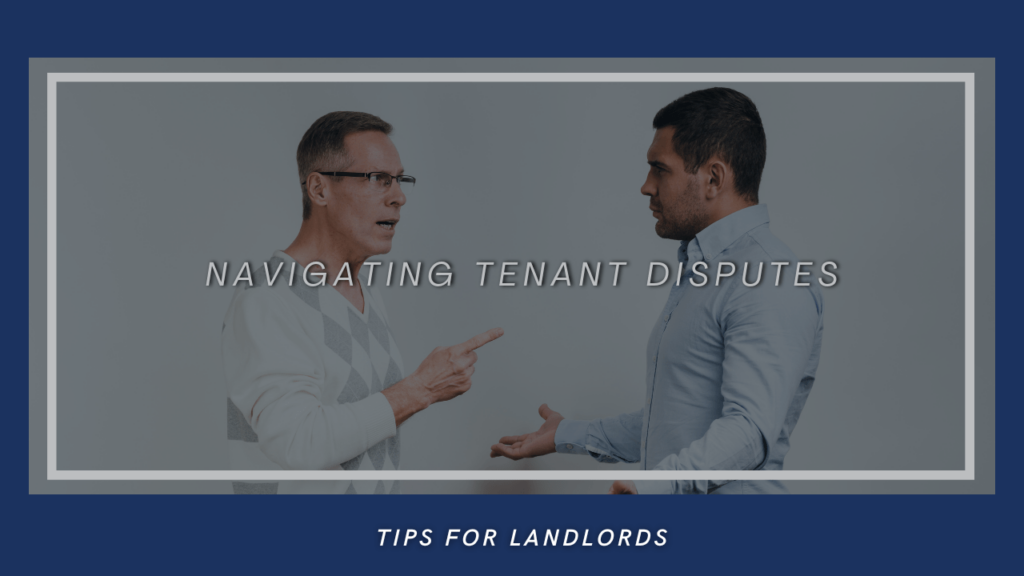
As a Roanoke landlord, one of the most important aspects of successfully managing your rental property is knowing how to navigate tenant disputes. This can be challenging; if not handled properly, disputes can lead to unhappy tenants or even expensive legal battles. And, while most of your time will be spent collecting rent and handling maintenance, occasionally you’ll be called upon to mediate an argument between your tenants. OR, you’ll have a tenant who is upset with you, and ready to argue about it.

Fortunately, with patience and an understanding of the law, these situations don’t have to overwhelm and frustrate you. Instead, they can provide an opportunity for strengthening relationships between both parties and creating a better living situation for everyone.
As property managers in Roanoke, we understand how quickly a conflict between tenants or with tenants can escalate. Remaining professional and objective is the most important thing you can do.
Here are some other tips for navigating those unpleasant tenant disputes.
Is This Even Your Problem?
Tenants are grown-ups – can’t you expect them to manage their own differences? Yes, but when your investment property is affected, you don’t want to be too disinterested. Encourage your residents to communicate with one another and work out solutions to their own problems, but don’t avoid or ignore the conflicts that may be brewing. It’s especially important that you get involved when a tenant comes for you seeking help. |
Everything Starts with a Strong Lease

When something pops off between your tenants and it looks like something has gone wrong, the first thing you want to do is consult your lease agreement. A thorough and well-drafted lease agreement will provide a lot of value in your landlord/tenant relationship. This is the document that provides a clear and consistent starting point for the tenancy, and the place you will always want to go when there are questions or problems.
A good lease will set forth expectations for your tenants and outline a process for dealing with tenants who act disrespectfully towards one another. This will help you manage conflicts between tenants and keep disputes to a minimum.
The lease must also address where a landlord’s responsibilities are and where a tenant must be held accountable. Many of the disputes that occur between landlords and tenants or tenants and neighbors can be prevented with a careful reading of the lease agreement. The lease is where all expectations and responsibilities are clearly laid out. For example, if there’s a dispute between two of your multi-family tenants about noise late at night, you can refer them to the quiet hours section of the lease agreement.
The lease agreement will also help when the dispute involves YOU. For example, maybe you and your tenant find yourselves in a dispute over late fees. They could be arguing that they don’t owe you a late fee for the rent that was only three days late, and you might argue that the grace period for late rent payments is only two days. To quickly and easily resolve this dispute, you can point your tenants to the rent collection policy that is surely included in your lease.
Common Conflict Areas
Your lease should address some of these most common areas of conflict and confusion.
| Pets and pet policies; where pets are permitted to be and restricted, whether they must be on leash or able to run free, and how tenants are required to clean up after them. | Parking. Are there assigned spaces or is it a first-come, first-served situation? Can cars be towed if they’re parked in the wrong spot? | Guests and how long they’re permitted to stay. What if one tenant’s guest is being disruptive to other tenants? Every tenant must be responsible for their visitors. |
| Smoking and whether it’s ever allowed inside the property or outside the property. | Noise and quiet hours. When do they begin and when do they end and what are the consequences for violating the quiet hours? | Aggression and harassment. How is this defined in your lease and what are the steps one tenant must take if they feel threatened by another tenant? |
Think about your lease agreement like it’s a road map. When your lease is clear, consistently enforced, and understood by all parties, you can avoid disputes and disagreements with and between tenants.
Sharpen Your Listening Skills and Practice Objectivity

When tenants are setting up to complain about something, they often expect a resolution.
But, sometimes, they simply want to be heard.
This gives you an opportunity to be a compassionate, empathetic, and supportive landlord.
Here’s an example of a tenant dispute that involves you, which can easily be rectified:
 When you place tenants in your property, those tenants expect that you will care enough about their privacy and right to the quiet enjoyment of their home that you’ll leave them alone. But, maybe you’re eager to ensure that they have everything they need and they’re happy. You might have started the relationship off on what you perceived to be a very friendly note. So, maybe you start showing up weekly to check on things. That’s disruptive. When your tenants ask you to leave them alone, don’t take it personally. Instead, listen to what they’re sharing with you, and respect their wishes. This helps you prevent what could have been an awkward tenant dispute.
When you place tenants in your property, those tenants expect that you will care enough about their privacy and right to the quiet enjoyment of their home that you’ll leave them alone. But, maybe you’re eager to ensure that they have everything they need and they’re happy. You might have started the relationship off on what you perceived to be a very friendly note. So, maybe you start showing up weekly to check on things. That’s disruptive. When your tenants ask you to leave them alone, don’t take it personally. Instead, listen to what they’re sharing with you, and respect their wishes. This helps you prevent what could have been an awkward tenant dispute.
Here’s an example of a dispute between tenants where listening actively can help:
 When a tenant comes to you and complains that their neighbor is interfering with the way that your tenant enjoys their property, you will want to listen to that complaint. Perhaps they have a small child who makes a lot of noise. There’s not a lot you can do about a noisy child. However, you can acknowledge the unpleasant problem of listening to a screaming child and brainstorm with your tenant some ways to combat the noise. You can check in a week or two later to see if things are any better. The tenant will appreciate that you care.
When a tenant comes to you and complains that their neighbor is interfering with the way that your tenant enjoys their property, you will want to listen to that complaint. Perhaps they have a small child who makes a lot of noise. There’s not a lot you can do about a noisy child. However, you can acknowledge the unpleasant problem of listening to a screaming child and brainstorm with your tenant some ways to combat the noise. You can check in a week or two later to see if things are any better. The tenant will appreciate that you care.
Prepare to listen.
This is the most important part of conflict resolution, and usually overlooked.
When your residents come to you with a complaint about noise, pet problems, parking issues, or other problems and nuisances that they’re experiencing, they want to be heard. If they cannot pay rent on time this month and they’ll be about a week late, they want to feel safe sharing this information with you. Whether or not they do feel good about communicating with you openly will depend on whether you’re a good listener.
It’s your responsibility to let your residents make their complaint. You may not be able to solve it. But, by listening empathetically and with compassion, you’re validating their concerns and demonstrating that you care about their comfort. This is good for your relationship and for your tenant retention.
Maybe you don’t actually know what it’s like to hear a dog bark in the upstairs unit all day or for a neighbor’s child to be constantly running through the backyard. But, you can agree that it’s disruptive and unfair. Ask questions when your tenant is sharing their concerns, and talk about what they’ve already done – or tried to do – to remedy the situation.
Sometimes, there will be complaints that have absolutely nothing to do with you. The traffic moves too fast outside. The landscapers next door start work too early. Tenants can complain about everything. It’s not your job to fix all the problems. It is your job to communicate well with your residents.
Three Pillars to Tenant Disputes:
Communication, Investigation, and Documentation

CommunicationThe way you communicate will be either an asset or a liability when it comes to tenant relationships. Good communication can always help resolve conflicts, and it should be embraced as an effective strategy when you’re working with tenants who are upset – rightfully or over something frivolous.
|
InvestigationRemember that your main role is to listen. If there’s a way to dig into their problem a little bit, you should do that. A neighbor tenant who is having loud parties all night long, for example, could be served a notice to come into compliance with the lease agreement, which establishes clear quiet hours. Talk to other tenants, especially if there’s a problem in the building. Find out if others are displeased by something but less willing to bring it to your attention. Some tenants are quick to complain and others keep all of their complaints inside. You want to get ahead of any potential problems so that you don’t suddenly find yourself with residents who are eager to leave your building. |
DocumentationAlways document the complaint in great detail in case it needs to be escalated. You never want to call law enforcement or other authorities, but if something occurs that puts a resident – or your property – in immediate danger, you may need to reach out to someone else. The more documentation you’ve collected, the stronger your position will be. |
The Good News
with HOAs
When your tenant is having a conflict with a neighbor, you may be in a much stronger position if you are renting out a property in an HOA or a condo association.
These associations are often complained about because of their strict rules and regulations, but in such a case, those rules and regulations can help you and your tenants.
You can go to the association board to resolve the issue or ask them to intervene and talk to the neighbor who is causing problems. There are almost certainly rules about noise, quiet hours, and pet clean-up.
Some Ideas on How to Avoid Conflicts and Disputes with and between Tenants
 We don’t like conflict. You probably don’t like conflict, either. So how can you prevent it in your rental properties?
We don’t like conflict. You probably don’t like conflict, either. So how can you prevent it in your rental properties?
We’ve got a few ideas, based on our many years of experience as Roanoke property managers. It isn’t difficult to deduce that most landlord and tenant disputes are the result of poor communication or one party not understanding their responsibilities. The worst disputes can lead to court appearances, and those rarely work out well for landlords. Let’s avoid court. Let’s avoid tenant disputes. Let’s keep those residents happy so that they’re paying rent, taking care of your property, and renewing their lease agreements.
Try these tips to avoid conflicts and disputes. You’re looking for harmony for both you and your tenants.
Screen tenants thoroughlyOne of the best ways to avoid tenant disputes is by attracting, placing, and retaining those residents who are unlikely to cause problems or initiate conflict. It might seem like this is hard to screen for, but there are ways to evaluate your screening data and make some inferences. Every tenant screening process needs to follow all fair housing laws. This is non-negotiable. You have to screen every applicant consistently and objectively. But, don’t be afraid to dig a little deeper. In addition to your financial screening and your investigation into prior evictions and criminal backgrounds, take a look at rental history. Talk to current and former landlords. |
Share clear expectationsYou cannot expect a tenant to be happy and perform well if they don’t understand what’s expected of them. Chaos and disorganization will always inspire conflict and disputes. This should start at the beginning of a lease term and be reinforced throughout the tenancy. Make sure your tenant knows what you expect from them while they live in your property. You’ll want rent to be paid on time, you’ll want your property to be cared for, and you’ll want any problems or repair needs to be brought to your attention immediately. Discuss the elements of the lease with your tenant before the move-in date so everyone understands their responsibilities and a tenant’s questions can be answered. |
Be responsive with maintenanceDon’t start conflicts and disputes yourself. One way to trigger a problem is by ignoring maintenance requests or putting them off without any explanation or communication at all. Be responsive when it comes to repairs. Your residents expect to live in a home that’s well-maintained and in good condition. That’s what they’re paying for. So, even if you cannot repair something right away, let your tenants know that you’re aware of the problem and you have a plan to take care of it. Educate your tenants on how to care for your property. If they know how to reset a garbage disposal and change the air filters, they won’t bother you for these small things. A good maintenance plan will eliminate a lot of conflict. |
Communicate well and oftenWe have already talked a lot about communication, but it’s something that really drives how your tenants interact with you and with each other. You’re leading by example, so make sure you’re communicating in a way that you expect tenants to communicate, too. Communication is critical to maintaining a good relationship with your tenant. Make sure they know how to reach you, and let them feel comfortable talking to you about things that might be of concern. Be fair and consistent so they know what to expect. You’ll be much better off if your tenants feel like they can come to you when rent is going to be late or damage has occurred at the home. |
The Value of Good Property Management

If you really want to avoid tenant disputes and encourage a harmonious relationship between tenants and with tenants, you have a secret weapon available: professional property management. Your property manager acts as a buffer between you and the tenants. Property managers are also more knowledgeable about landlord and tenant law, and they have experience dealing with tenant disputes. You can save yourself a lot of time, and potentially a lot of money and liability by working with a management company.
We are happy to report that we don’t deal with a lot of tenant conflict or disputes. We establish and maintain great relationships, and we’re systematic and methodical about taking care of any minor problems or concerns that may pop up.
Let’s talk about how we can help. Please contact us at Lawson Realty Group whether you’re a new investor or an experienced real estate owner. We manage properties in Southwest Virginia throughout the Roanoke Valley, including Salem, Cave Spring, Hollins, Vinton, Glenvar, and Southwest Roanoke County.
